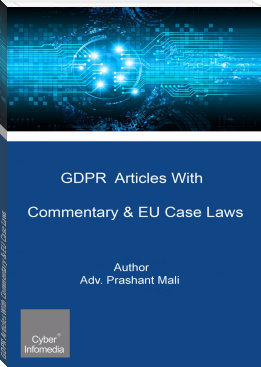GDPR Articles With Commentary & EU Case Laws - Adv. Prashant Mali (bill gates book recommendations .TXT) 📗

- Author: Adv. Prashant Mali
Book online «GDPR Articles With Commentary & EU Case Laws - Adv. Prashant Mali (bill gates book recommendations .TXT) 📗». Author Adv. Prashant Mali
Vital interests of the data subject
The processing of personal data should also be regarded to be lawful where it is necessary to protect an interest which is essential for the life of the data subject or that of another natural person. Processing of personal data based on the vital interest of another natural person should in principle take place only where the processing cannot be manifestly based on another legal basis. Some types of processing may serve both important grounds of public interest and the vital interests of the data subject as for instance when processing is necessary for humanitarian purposes, including for monitoring epidemics and their spread or in situations of humanitarian emergencies, in particular in situations of natural and man-made disasters.
Overriding legitimate interest
The legitimate interests of a controller, including those of a controller to which the personal data may be disclosed, or of a third party, may provide a legal basis for processing, provided that the interests or the fundamental rights and freedoms of the data subject are not overriding, taking into consideration the reasonable expectations of data subjects based on their relationship with the controller. Such legitimate interest could exist for example where there is a relevant and appropriate relationship between the data subject and the controller in situations such as where the data subject is a client or in the service of the controller. At any rate the existence of a legitimate interest would need careful assessment including whether a data subject can reasonably expect at the time and in the context of the collection of the personal data that processing for that purpose may take place. The interests and fundamental rights of the data subject could in particular override the interest of the data controller where personal data are processed in circumstances where data subjects do not reasonably expect further processing. Given that it is for the legislator to provide by law for the legal basis for public authorities to process personal data, that legal basis should not apply to the processing by public authorities in the performance of their tasks. The processing of personal data strictly necessary for the purposes of preventing fraud also constitutes a legitimate interest of the data controller concerned. The processing of personal data for direct marketing purposes may be regarded as carried out for a legitimate interest
Overriding legitimate interest within group of undertakings
Controllers that are part of a group of undertakings or institutions affiliated to a central body may have a legitimate interest in transmitting personal data within the group of undertakings for internal administrative purposes, including the processing of clients’ or employees’ personal data. The general principles for the transfer of personal data, within a group of undertakings, to an undertaking located in a third country remain unaffected.
Network and information security as overriding legitimate interest
The processing of personal data to the extent strictly necessary and proportionate for the purposes of ensuring network and information security, i.e. the ability of a network or an information system to resist, at a given level of confidence, accidental events or unlawful or malicious actions that compromise the availability, authenticity, integrity and confidentiality of stored or transmitted personal data, and the security of the related services offered by, or accessible via, those networks and systems, by public authorities, by computer emergency response teams (CERTs), computer security incident response teams (CSIRTs), by providers of electronic communications networks and services and by providers of security technologies and services, constitutes a legitimate interest of the data controller concerned. This could, for example, include preventing unauthorised access to electronic communications networks and malicious code distribution and stopping ‘denial of service’ attacks and damage to computer and electronic communication systems.
Further processing of personal data
The processing of personal data for purposes other than those for which the personal data were initially collected should be allowed only where the processing is compatible with the purposes for which the personal data were initially collected. In such a case, no legal basis separate from that which allowed the collection of the personal data is required. If the processing is necessary for the performance of a task carried out in the public interest or in the exercise of official authority vested in the controller, Union or Member State law may determine and specify the tasks and purposes for which the further processing should be regarded as compatible and lawful. Further processing for archiving purposes in the public interest, scientific or historical research purposes or statistical purposes should be considered to be compatible lawful processing operations. The legal basis provided by Union or Member State law for the processing of personal data may also provide a legal basis for further processing. In order to ascertain whether a purpose of further processing is compatible with the purpose for which the personal data are initially collected, the controller, after having met all the requirements for the lawfulness of the original processing, should take into account, inter alia: any link between those purposes and the purposes of the intended further processing; the context in which the personal data have been collected, in particular the reasonable expectations of data subjects based on their relationship with the controller as to their further use; the nature of the personal data; the consequences of the intended further processing for data subjects; and the existence of appropriate safeguards in both the original and intended further processing operations.
Where the data subject has given consent or the processing is based on Union or Member State law which constitutes a necessary and proportionate measure in a democratic society to safeguard, in particular, important objectives of general public interest, the controller should be allowed to further process the personal data irrespective of the compatibility of the purposes. In any case, the application of the principles set out in this Regulation and in particular the information of the data subject on those other purposes and on his or her rights including the right to object, should be ensured. Indicating possible criminal acts or threats to public security by the controller and transmitting the relevant personal data in individual cases or in several cases relating to the same criminal act or threats to public security to a competent authority should be regarded as being in the legitimate interest pursued by the controller. However, such transmission in the legitimate interest of the controller or further processing of personal data should be prohibited if the processing is not compatible with a legal, professional or other binding obligation of secrecy.
Protecting sensitive personal data
Personal data which are, by their nature, particularly sensitive in relation to fundamental rights and freedoms merit specific protection as the context of their processing could create significant risks to the fundamental rights and freedoms. Those personal data should include personal data revealing racial or ethnic origin, whereby the use of the term ‘racial origin’ in this Regulation does not imply an acceptance by the Union of theories which attempt to determine the existence of separate human races. The processing of photographs should not systematically be considered to be processing of special categories of personal data as they are covered by the definition of biometric data only when processed through a specific technical means allowing the unique identification or authentication of a natural person. Such personal data should not be processed, unless processing is allowed in specific cases set out in this Regulation, taking into account that Member States law may lay down specific provisions on data protection in order to adapt the application of the rules of this Regulation for compliance with a legal obligation or for the performance of a task carried out in the public interest or in the exercise of official authority vested in the controller. In addition to the specific requirements for such processing, the general principles and other rules of this Regulation should apply, in particular as regards the conditions for lawful processing. Derogations from the general prohibition for processing such special categories of personal data should be explicitly provided, inter alia, where the data subject gives his or her explicit consent or in respect of specific needs in particular where the processing is carried out in the course of legitimate activities by certain associations or foundations the purpose of which is to permit the exercise of fundamental freedoms.
Exceptions to the prohibition on processing special categories of personal data
Derogating from the prohibition on processing special categories of personal data should also be allowed when provided for in Union or Member State law and subject to suitable safeguards, so as to protect personal data and other fundamental rights, where it is in the public interest to do so, in particular processing personal data in the field of employment law, social protection law including pensions and for health security, monitoring and alert purposes, the prevention or control of communicable diseases and other serious threats to health. Such a derogation may be made for health purposes, including public health and the management of health-care services, especially in order to ensure the quality and cost-effectiveness of the procedures used for settling claims for benefits and services in the health insurance system, or for archiving purposes in the public interest, scientific or historical research purposes or statistical purposes. A derogation should also allow the processing of such personal data where necessary for the establishment, exercise or defence of legal claims, whether in court proceedings or in an administrative or out- of-court procedure.
Processing of sensitive data in health and social sector
Special categories of personal data which merit higher protection should be processed for health-related purposes only where necessary to achieve those purposes for the benefit of natural persons and society as a whole, in particular in the context of the management of health or social care services and systems, including processing by the management and central national health authorities of such data for the purpose of quality control, management information and the general national and local supervision of the health or social care system, and ensuring continuity of health or social care and cross-border healthcare or health security, monitoring and alert purposes, or for archiving purposes in the public interest, scientific or historical research purposes or statistical purposes, based on Union or Member State law which has to meet an objective of public interest, as well as for studies conducted in the public interest in the area of public health. Therefore, this Regulation should provide for harmonised conditions for the processing of special categories of personal data concerning health, in respect of specific needs, in particular where the processing of such data is carried out for certain health-related purposes by persons subject to a legal obligation of professional secrecy. Union or Member State law should provide for specific and suitable measures so as to protect the fundamental rights and the personal data of natural persons. Member States should be allowed to maintain or introduce further conditions, including limitations, with regard to the processing of genetic data, biometric data or data concerning health. However, this should not hamper the free flow of personal data within the Union when those conditions apply to cross-border processing of such data.
Processing of sensitive data in public health sector
The processing of special categories of personal data may be necessary for reasons of public interest in the areas of public health without consent of the data subject. Such processing should be subject to suitable and specific measures so as to protect the rights and freedoms of natural persons. In that context, ‘public health’ should be interpreted as defined in Regulation (EC) No 1338/2008 of





Comments (0)